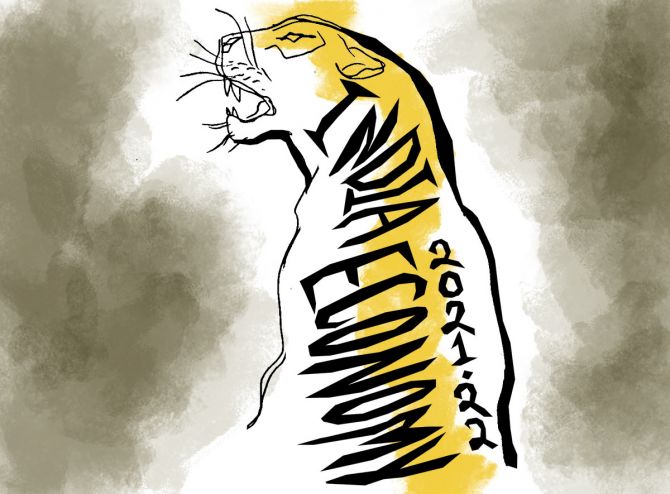India's economy, estimated to contract by 6.9 per cent in 2020 due to the coronavirus pandemic, is forecast to record a "stronger recovery" in 2021 and grow by 5 per cent, according to a UN report which said the country's current fiscal year budget points to a shift towards demand-side stimulus, with an uptick in public investment.

The report, 'Out of the frying pan …Into the fire?' published Thursday as an update to the Trade and Development Report 2020 by UN Conference on Trade and Development (UNCTAD) said the global economy is set to grow by 4.7 per cent this year, faster than the 4.3 per cent predicted in September 2020, thanks in part to a stronger recovery in the US, where progress in distributing vaccines and a fresh fiscal stimulus of $1.9 trillion are expected to boost consumer spending.
The report described the year 2020 as “Annus horribilis” saying although warnings about the spread of viruses have become more frequent in recent years, “nobody anticipated the arrival of COVID-19 or its dramatic global impact.”
India is estimated to contract by 6.9 per cent in 2020 and then forecast to record a 5 per cent GDP growth in 2021, the report said.
The September 2020 report by UNCTAD had said that India's economy was forecast to contract by 5.9 per cent in 2020 and recover to 3.9 per cent in 2021.
“India's growth performance in 2020 fell below our mid-2020 expectations.
"Actual fiscal stimulus fell short of initial announcements that suggested a large increase of public spending for pandemic relief,” UNCTAD said.
The UN agency added that the relief measures adopted by India “were not only much smaller in scale, but also centred on easing supply-side constraints and providing liquidity support rather than aggregate demand support.
“Moreover, restrictions to people's movement not only severely affected incomes and consumption, they also proved largely unsuccessful in containing the spread of the virus.
"As a result, the fall in economic activity proved to be larger than we had envisaged in mid-2020,” it said.
The report noted that the deeper than expected downturn in 2020 explains in part the stronger recovery now projected for 2021 for India.
“The budget for the fiscal year from April 2021 to March 2022 also points to a shift towards demand-side stimulus, with an uptick in public investment (particularly in transport infrastructure) for the coming fiscal year.
"An anticipated recovery in global demand will also help buoy the export sector through 2021,” it said.
The accumulated real income loss relative to pre-COVID-19 trend, 2020-2021 (% of GDP) for India is 27.7 per cent.
The US, which contracted by 3.5 per cent in 2020, is forecast to grow by 4.5 per cent this year.
China is projected to record an 8.1 per cent growth in 2021.
UNCTAD said the 4.7 per cent growth projected for the world will still leave the global economy over $10 trillion short of where it could have been by the end of 2021 if it had stayed on the pre-pandemic trend and with persistent worries about the reality behind the rhetoric of a more resilient future.
“A misguided return to austerity after a deep and destructive recession is the main risk to our global outlook,” the report said.
UNCTAD said in a statement that the "brunt of the hit to the global economy is being felt in developing countries" with limited fiscal space, tightening balance of payments constraints and inadequate international support.
While all regions will see a turnaround this year, potential downside health and economic risks could still produce slippages.
Looking ahead, UNCTAD says, “outdated economic dogmas, weak multilateral cooperation and a widespread reluctance to tackle the problems of inequality, indebtedness and insufficient investment – all worsening thanks to COVID-19.”
It added that, without a change of course, the new normal for many will be an unbalanced recovery, vulnerability to further shocks and persistent economic insecurity.
It notes that the global recovery that began in the third quarter of 2020 is expected to continue through 2021, albeit with a good deal of unevenness and unpredictability, reflecting epidemiological, policy and coordination uncertainties.
“But even barring an immediate return of austerity," the report adds, “it will take more than one year for output and employment to return to their pre-COVID-19 levels in most countries with employment, income inequality and public welfare over the medium term depending on the evolution of policy responses.”
The COVID-19 will likely have lasting economic, as well as health consequences, which will require continued government support, it said, adding that there must be a more wholesale rewriting of the rules of the economic game “if the mistakes of the 2009 financial crisis are not to be repeated and the goal of an inclusive, sustainable and resilient global economy realised by 2030”.










